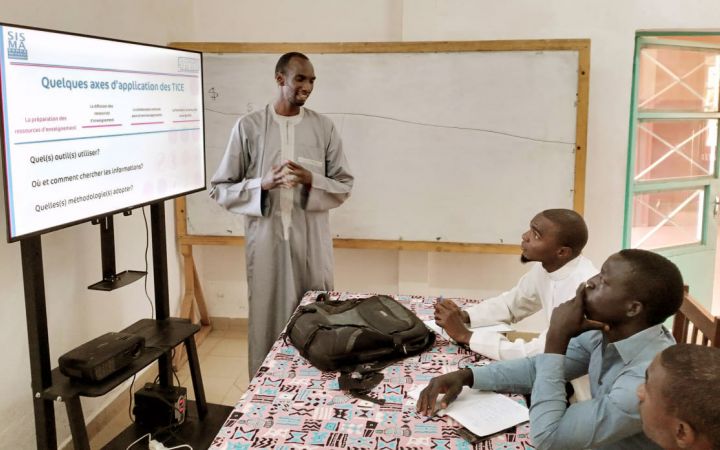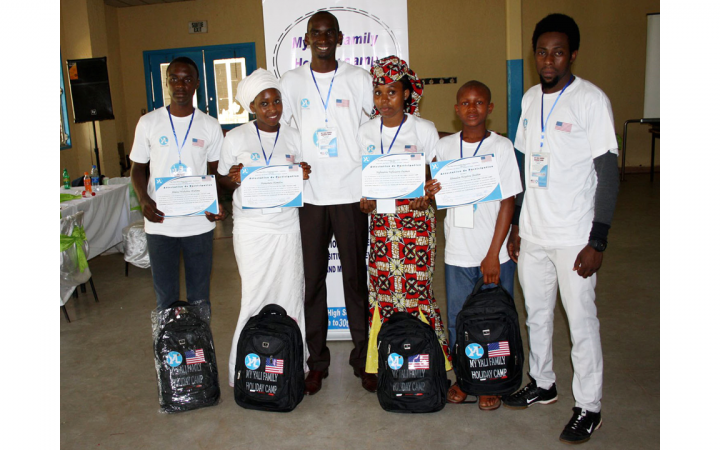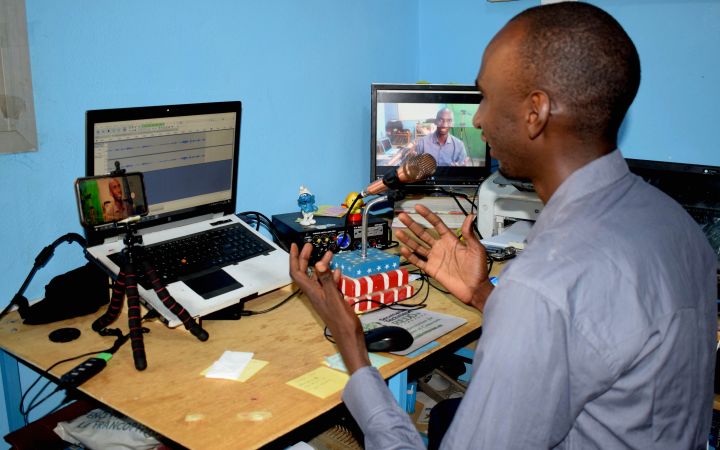- Educator and UNITAR alumnus Mohamadou Bello wants to make learning accessible to more women and young people in Cameroon.
- Mohamadou is creating a multilingual e-learning platform, using his experience with digital learning and what he learned in the The UNITAR 2021 Strategic Response to COVID-19 Crisis: Empowering the Sahel Region through Digital Reskilling and Upskilling to Enhance Productive Sources of Livelihood and Employment training programme.
- The programme, provided by the UNITAR Division for Prosperity, helps professionals from the Sahel region transform their entrepreneurial ideas into digital products that address critical local issues.
- The second round of the French-language online training programme ran January-February 2022 with 500 learners, supported by the government of Japan.
- Participants learned programming, coding, and application development, built digital literacy, and deepened their understanding of cybersecurity, artificial intelligence, and gender leadership.
February 2022, Hiroshima, Japan - Mohamadou Bello wants to use apply his extensive experience in education and digital learning to make broadly accessible, multilingual e-learning platforms for the people of Cameroon. The UNITAR 2021 Strategic Response to COVID-19 Crisis: Empowering the Sahel Region through Digital Reskilling and Upskilling to Enhance Productive Sources of Livelihood and Employment training programme is helping him bring this dream to reality.
I have an issue, I have a solution. And now I am finding how to implement it in practice.
Mohamadou hails from the Adamawa region of Cameroon. As a secondary-school English and French teacher, he daily sees the challenges facing the young people of his country. Insecurity from Boko Haram attacks prevent children from attending school, while poverty pressures young people to leave the education system early to earn money. While gender gaps are improving, literacy rates for young women (15-24 years old), at 82 per cent, is still lower than that of young men (88 per cent).
A passionate learner himself, Mohamadou studies through online resources such as Khan Academy and MIT Open Online Courses. And he shares educational materials with others through YouTube. So when he heard about this UNITAR Programme, he quickly took the opportunity to join.
The Sahel Region Digital Reskilling Programme
The UNITAR digital reskilling programme helps motivated professionals from the Sahel region transform their entrepreneurial ideas into digital products that empower others and address critical issues in their communities. Supported by the government of Japan, the first round of the programme concluded in 2021 with 500 learners.
The second round of the French-language online training programme began 3 January 2022, joined by 500 new learners. Over six weeks, participants learned programming, coding, and application development, built digital literacy, and deepened their understanding of cybersecurity and artificial intelligence. The training in hard skills was combined with gender leadership training.
Dreams to bring accessible learning to the people
Throughout the programme, participants practiced what they were learning on individual projects. Mohamadou's project is to create an e-learning platform that offers learning to anyone, especially youth and women.
The project idea stems from what he observed as a teacher:
If I have 100 students in the first year of secondary school, I have 40 girls and 60 boys. By the fourth year, I realize that I can have still 50 in school, but maybe only 10 girls. So I said, 'Okay, as there is a lot of school dropout among girls, there is a need of giving them other possibilities to learn, out of the conventional or traditional way of instruction.
His vision is to provide content in local languages, such as Fulfulde (his mother tongue), Hausa and many others. In Cameroon, French and English are the official languages, but approximately 28 per cent of the population is estimated to be illiterate in both [2005; direct link to PDF]. "If you don't go to school, it is very difficult for you to learn these languages," says Mohamadou. There are also few educational materials available in the country's 260+ local languages.
Other ways he plans to make learning accessible is by using multimedia and mobile apps. While few people have access to a good computer and electricity supply can be unreliable, particularly in rural areas, more people would have a phone. "Whatever the level of people, they can at least use a phone," says Mohamadou.
Mohamadou believes the programme's practical training is already helping him see his way to make his project a reality. For example, he now knows how to run a needs assessment to determine the topics for the platform.
To fellow learners, especially in online courses, Mohamadou acknowledges that it can be difficult as life gets busy and internet connections are unstable. But the passionate educator encourages everyone to keep going to the end.
There is nothing to lose. People should not surrender because they have some challenges. Because there's too much to win during this programme.









